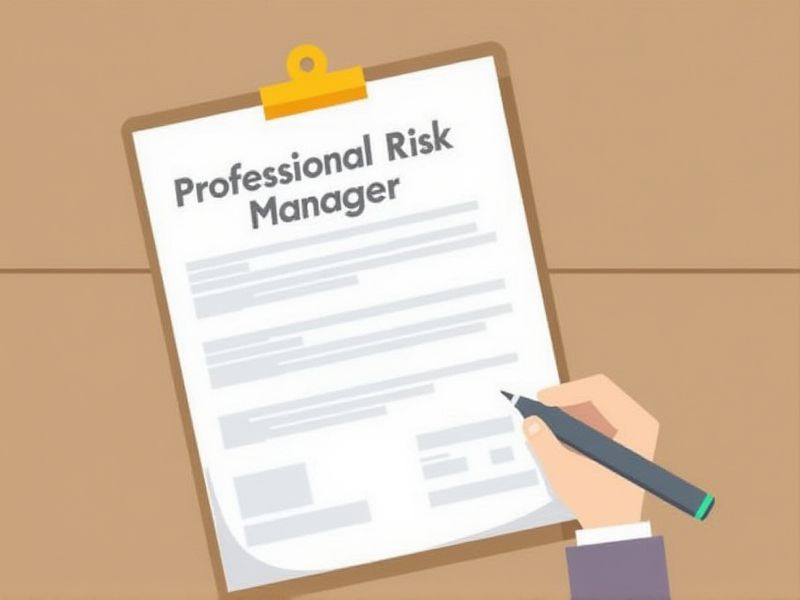
Risk management professionals operate in intricate financial environments where precision and informed decision-making are critical. Obtaining certain certifications equips them with the knowledge needed to identify, assess, and mitigate potential risks effectively. Certifications also enhance credibility, showcasing an ability to uphold industry standards and best practices. Essential certifications that a Professional Risk Manager might seek include the following.
Professional Risk Manager (PRM)
Organizations face increasingly complex financial environments, prompting the need for a Professional Risk Manager (PRM) to navigate potential pitfalls effectively. The PRM designation provides assurance that an individual possesses the expertise to identify, quantify, and manage various risks inherent in modern financial markets. As compliance and regulatory standards become more stringent, having a certified PRM ensures that a company meets these requirements, reducing exposure to legal and financial liabilities. With the ability to implement robust risk management frameworks, PRMs maintain the organization's stability and protect its reputation against market fluctuations.
Financial Risk Manager (FRM)
Financial Risk Managers (FRMs) are crucial because they specialize in identifying, assessing, and mitigating financial risks, which helps organizations prevent significant losses. Their expertise complements the broader scope of a Professional Risk Manager by providing targeted strategies for financial-specific threats. This specialization supports strategic decision-making by providing insights on market trends, credit risk, and operational vulnerabilities. Collaboration between FRMs and Professional Risk Managers enhances an organization's overall risk management framework, ensuring comprehensive protection against potential financial disruptions.
Certified Risk Manager (CRM)
Certified Risk Manager (CRM) designation equips individuals with specialized knowledge to identify and mitigate potential risks effectively. Professional Risk Managers often face complex financial uncertainties which require the nuanced understanding that CRM training provides. Expertise from CRM certification enhances decision-making by incorporating comprehensive risk assessment techniques. Companies benefit by minimizing losses and improving strategic foresight when employing professionals with both a CRM and practical risk management experience.
Chartered Financial Analyst (CFA)
The CFA charter provides a comprehensive understanding of investment analysis, portfolio management, and financial ethics, crucial for a Professional Risk Manager to make informed decisions. Its rigorous curriculum enhances quantitative skills, enabling risk managers to accurately assess and mitigate financial risks. Having the CFA designation establishes credibility and trust, which can be essential in gaining the confidence of clients and colleagues in risk management scenarios. The global recognition of the CFA credential facilitates cross-border financial operations, aiding Professional Risk Managers in navigating complex international risk environments.
Chartered Alternative Investment Analyst (CAIA)
Professional Risk Managers often face complex investment environments. Obtaining the Chartered Alternative Investment Analyst (CAIA) designation provides specialized knowledge in alternative investments, enhancing their ability to assess and manage various risks. CAIA certification adds credibility, signaling to employers and clients a strong proficiency in niche financial sectors. This expertise helps in developing risk management strategies that incorporate alternatives, promoting more comprehensive risk assessments.
Certificate in Quantitative Finance (CQF)
The CQF enhances a professional risk manager's quantitative skills, crucial for effective risk assessment and management in increasingly complex financial markets. As financial regulations grow more stringent, understanding mathematical modeling and financial engineering helps in compliance and strategic decision-making. The hands-on curriculum of CQF provides practical experience, enabling risk managers to apply advanced quantitative methods to real-world problems. A CQF credential signals to employers a commitment to ongoing expertise and capability, often leading to career advancement and improved job opportunities.
Associate in Risk Management (ARM)
The Associate in Risk Management (ARM) certification equips professionals with vital skills in assessing and managing risks effectively, fostering more informed decision-making. This credential enhances a risk manager's ability to identify potential hazards and implement strategies to mitigate them. With heightened expertise in risk analytics through ARM training, professionals can offer comprehensive risk assessments that align with organizational goals. The designation signals credibility and commitment to excellence, impacting career advancement and organizational trust positively.
Certified Treasury Professional (CTP)
Earning a Certified Treasury Professional (CTP) designation enhances a risk manager's understanding of cash management and liquidity, which is crucial for mitigating financial risks. The credential signifies expertise in treasury and finance operations, providing a solid foundation for assessing financial risks more accurately. Organizations value CTP holders for their ability to implement effective risk management strategies through improved cash flow forecasting and liquidity management. This certification also increases a professional's credibility and marketability, leading to more advanced career opportunities in financial risk management.
Certified Information Systems Auditor (CISA)
Obtaining a CISA certification validates a professional risk manager's expertise in IT auditing, security, and control. This certification enhances their ability to identify and mitigate IT-related risks within an organization, ensuring compliance with established standards. With CISA, risk managers gain a structured approach to auditing and risk assessment, offering assurance to stakeholders about the reliability of systems. It serves as a globally recognized benchmark, elevating a risk manager's credibility and professional standing.
Project Management Professional (PMP)
Holding the PMP certification enables a Professional Risk Manager to systematically plan and execute risk assessments, ensuring projects are completed on time and within budget. PMP provides a structured framework that enhances the ability to identify, analyze, and mitigate potential risks effectively. With PMP methodologies, a risk manager can integrate risk strategies into broader project management processes, promoting alignment and coherence. The certification also boosts credibility and recognition in the industry, leading to better career opportunities and professional growth.
Summary
When you, as a Professional Risk Manager, obtain certifications, you can expect enhanced credibility and recognition in your field. This can lead to increased career opportunities and potential salary benefits. Your competency and expertise in risk management are likely to improve, ensuring better decision-making. The certifications can also expand your professional network, connecting you with industry leaders and peers.
